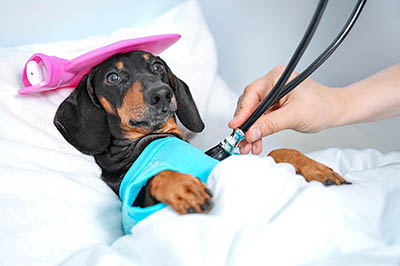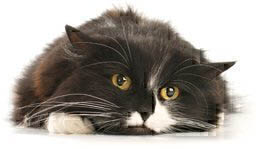Signs that Your Pet Might Need a Vet
Last updated December 2021
Because many health problems are subtle and easily overlooked, you should regularly evaluate your pet’s general health with a nose-to-tail inspection. The following checklist, excerpted from a Humane Society of the United States publication, includes warning signs of possible problems. Keep in mind that this list applies generally to both dogs and cats, and that the best measure of your pet’s health is whether or not the individual animal’s appearance and behavior is normal.
 General
General
Good signs
- Animal is bright, alert, and responsive
- Animal is balanced and coordinated
- Body temperature is normal
- Animal is interested in/oriented to surroundings
Warning signs
- Vomiting or diarrhea
- Wounds or abscesses
- Any swelling, lumps, or bumps
- Animal is losing or gaining weight
- Mammary glands are swollen or discharging fluid
- Coughing, sneezing, or wheezing
- Animal appears uncoordinated or disoriented
- Animal tilts head
- Animal repeatedly walks in circles
- Abdomen is bloated
- Abnormal body temperature
- Hyperactive or lethargic activity
- Excessive water drinking or urination
Breathing/Respiration
Good signs
- Respiration sounds clear and rate is normal
Warning signs
- Breathing is irregular, rapid, shallow, or labored
- Animal is sneezing, coughing, or wheezing excessively
- Breathing is through open mouth
 Eyes
Eyes
Good signs
- Clean, clear, and bright
- Responsive to visual stimuli
Warning signs
- Watery
- Red, inflamed, or swollen
- Filmy, cloudy, or discolored
- Dry
- Hypersensitive to light
- Pupils unequal in size or overly dilated or constricted
- Third (or middle) eyelid showing
- Itchy (animal rubbing at eyes)
- Painful (animal squinting)
Ears
Good signs
- Both outer ear and canal are clean and canal is pink
- Responsive to noise
Warning signs
- Showing discharge (waxy or other)
- Crusty or scabbed tissue
- Red, inflamed, or swollen
- Hair around ear is matted
- Itchy (animal scratching ear or shaking head)
- Unusual smells
- Painful (animal cries or winces when ear is touched)
Nose
Good signs
- Clean
- Free of discharge
Warning signs
- Tissue is scabbed, crusty, or cracked
- Showing discharge
- Congested or blocked
Mouth
Good signs
- Free of odor
- Teeth are clean
- Gums are pink—after being pressed with finger, pink gum color returns within one to two seconds
Warning signs
- Animal has trouble eating or swallowing
- Unusually pale, red, or purple gums
- Dry
- Excessive salivating
- Foul odor not caused by food
- Showing discharge
- Swollen or inflamed
- Teeth are loose, pitted, broken, or tartar-covered
- Animal is pawing at or rubbing the mouth
Skin/Hair
Good signs
- Skin is elastic (springs back immediately after being raised between the shoulder blades)
- Coat is bright and glossy
- Skin is clean and free of oil
- Skin is free of swelling, lumps, mats, or lesions
Warning signs
- Coat is dull, oily, or dirty
- Coat has areas of hair loss or thinning
- Hair is matted
- Skin is dry, flaky, scabby, or shows swelling, lumps, or lesions
- Skin is red or irritated
- Fleas, ticks, lice, or other parasites
Legs/Paws
Good signs
- Legs support weight evenly (no limping)
- Pads are clean and smooth
- Nails are healthy-looking
Warning signs
- Animal favors one leg
- Animal has limited motion, or is weak or uncoordinated
- Joints feel tender
- Pads are cracked or hard
- Pads have matted hair between them
- Nails are long, short, or ingrown
- Swelling, lumps, or lesions
Anal/Genital
Good signs
- Area is clean and free of discharge
- Stool is normal in appearance, color, and consistency
Warning signs
- Increased or decreased urination or droppings
- Stool is watery or bloody
- Area around anus shows swelling or lumps
- Swollen testicles (one larger than the other)
- Foul odor
- Animal is dragging rear end on the ground
- Animal is excessively licking area


